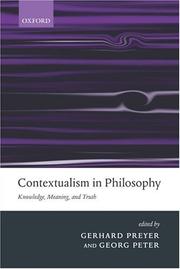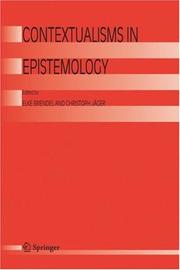| Listing 1 - 10 of 56 | << page >> |
Sort by
|
Book
ISBN: 9780199692255 0199692254 Year: 2011 Publisher: Oxford : Oxford University Press,
Abstract | Keywords | Export | Availability | Bookmark
 Loading...
Loading...Choose an application
- Reference Manager
- EndNote
- RefWorks (Direct export to RefWorks)
Book
Year: 2019 Publisher: Stockholm : Stockholm University Press,
Abstract | Keywords | Export | Availability | Bookmark
 Loading...
Loading...Choose an application
- Reference Manager
- EndNote
- RefWorks (Direct export to RefWorks)
"This book is about a concept which is constantly used in many different ways, but also one of the most common concepts in humanities: context. However, the significance and use of this concept shifts between disciplines, and sometimes within the same discipline. All chapters in this edited volume address a concrete situation where this concept is used. The authors demonstrate how it can be applied in interpretations of images, buildings and places from different historical periods, and how it affects the ability to create meaning and knowledge. The interpretative action thus entails different forms of contextualisation. The book is primarily addressed to students of art history and others who take an interest in questions of visuality and visual practices. Offering not only a theoretical understanding of the concept, it strives to point out ways and possibilities of the practical use of contextualisation. This book constitutes the second volume of Theoretical Applications in Art History, which forms part of the series Basic Readings in Culture and Aesthetics."
Book
Year: 2019 Publisher: Stockholm : Stockholm University Press,
Abstract | Keywords | Export | Availability | Bookmark
 Loading...
Loading...Choose an application
- Reference Manager
- EndNote
- RefWorks (Direct export to RefWorks)
"This book is about a concept which is constantly used in many different ways, but also one of the most common concepts in humanities: context. However, the significance and use of this concept shifts between disciplines, and sometimes within the same discipline. All chapters in this edited volume address a concrete situation where this concept is used. The authors demonstrate how it can be applied in interpretations of images, buildings and places from different historical periods, and how it affects the ability to create meaning and knowledge. The interpretative action thus entails different forms of contextualisation. The book is primarily addressed to students of art history and others who take an interest in questions of visuality and visual practices. Offering not only a theoretical understanding of the concept, it strives to point out ways and possibilities of the practical use of contextualisation. This book constitutes the second volume of Theoretical Applications in Art History, which forms part of the series Basic Readings in Culture and Aesthetics."
Book
Year: 2019 Publisher: Stockholm : Stockholm University Press,
Abstract | Keywords | Export | Availability | Bookmark
 Loading...
Loading...Choose an application
- Reference Manager
- EndNote
- RefWorks (Direct export to RefWorks)
"This book is about a concept which is constantly used in many different ways, but also one of the most common concepts in humanities: context. However, the significance and use of this concept shifts between disciplines, and sometimes within the same discipline. All chapters in this edited volume address a concrete situation where this concept is used. The authors demonstrate how it can be applied in interpretations of images, buildings and places from different historical periods, and how it affects the ability to create meaning and knowledge. The interpretative action thus entails different forms of contextualisation. The book is primarily addressed to students of art history and others who take an interest in questions of visuality and visual practices. Offering not only a theoretical understanding of the concept, it strives to point out ways and possibilities of the practical use of contextualisation. This book constitutes the second volume of Theoretical Applications in Art History, which forms part of the series Basic Readings in Culture and Aesthetics."

ISBN: 1280755040 0191556181 142377096X 9781423770961 0199267413 9786610755042 6610755043 0199267405 9780199267408 9780199267415 0199267413 Year: 2005 Publisher: Oxford New York Clarendon Press Oxford University Press
Abstract | Keywords | Export | Availability | Bookmark
 Loading...
Loading...Choose an application
- Reference Manager
- EndNote
- RefWorks (Direct export to RefWorks)
In epistemology and in philosophy of language there is fierce debate about the role of context in knowledge, understanding, and meaning. Many contemporary epistemologists take seriously the thesis that epistemic vocabulary is context-sensitive. This thesis is of course a semantic claim, so it has brought epistemologists into contact with work on context in semantics by philosophers of language. This volume brings together the debates, in a set of twelve specially written essays representing the latest work by leading figures in the two fields. All future work on contextualism will start here.
Contextualism (Philosophy). --- Philosophy --- Contextualism (Philosophy)

ISBN: 1402031815 Year: 2005 Publisher: Dordrecht : Springer,
Abstract | Keywords | Export | Availability | Bookmark
 Loading...
Loading...Choose an application
- Reference Manager
- EndNote
- RefWorks (Direct export to RefWorks)
Contextualism (Philosophy) --- Knowledge, Theory of --- Contextualism (Philosophy).
Book
ISBN: 9782204097819 2204097810 Year: 2012 Publisher: Paris: Cerf,
Abstract | Keywords | Export | Availability | Bookmark
 Loading...
Loading...Choose an application
- Reference Manager
- EndNote
- RefWorks (Direct export to RefWorks)
Alors que de notre naissance à notre mort, nous sommes immergés dans notre contexte, celui-ci reste le grand oublié des théories morales. Aux yeux de la philosophie, le contexte a toujours été inessentiel : il a même toujours été ce dont les grands principes devaient être épurés, s'ils devaient prétendre à une quelconque validité. Or, la contextualité est notre première condition. Si donc, pour établir une théorie morale, nous ne voulons pas partir de principes abstraits mais de l'expérience des acteurs, c'est de cette contextualité qu'il faut commencer. Ainsi, on voit que l'oubli du contexte par la théorie morale apporte simultanément l'oubli de l'expérience morale, telle qu'elle est vécue par les acteurs eux-mêmes. Car le contexte est la première source de leur expérience morale, pour laquelle il constitue d'abord un pôle de confiance. Mais les acteurs peuvent aussi critiquer le contexte. L'originalité du contextualisme défendu par Mark Hunyadi est de montrer que les acteurs trouvent dans leur contexte même toutes les ressources pour le critiquer, en totalité ou en partie. Les critères de la critique sont toujours déjà là. "Le contexte donne tout, y compris la puissance de le critiquer." Voilà une leçon difficile à entendre pour des oreilles érodées par 2 500 ans de platonico-kantisme, c'est-à-dire d'épuration éthique voulant se préserver de toute contamination contextuelle. Telle est pourtant la leçon, aux conséquences de vaste portée, de L'Homme en contexte.
Book
ISBN: 0192535919 0191846023 0192535900 9780192535900 9780199564477 0199564477 9780191846021 Year: 2017 Publisher: Oxford, United Kingdom
Abstract | Keywords | Export | Availability | Bookmark
 Loading...
Loading...Choose an application
- Reference Manager
- EndNote
- RefWorks (Direct export to RefWorks)
Keith DeRose presents, develops, and defends original solutions to two of the stickiest problems in epistemology: skeptical hypotheses and the lottery problem. He deploys a powerful version of contextualism, the view that the epistemic standards for the attribution of knowledge vary with context.
Book
ISBN: 9781138818392 9781315745275 9781317594673 1138818399 Year: 2017 Publisher: New York Routledge
Abstract | Keywords | Export | Availability | Bookmark
 Loading...
Loading...Choose an application
- Reference Manager
- EndNote
- RefWorks (Direct export to RefWorks)
Epistemic contextualism is a recent and hotly debated topic in philosophy. Contextualists argue that the language we use to attribute knowledge can only be properly understood relative to a specified context. How much can our knowledge depend on context? Is there a limit, and if so, where does it lie? What is the relationship between epistemic contextualism and fundamental topics in philosophy such as objectivity, truth, and relativism? The Routledge Handbook of Epistemic Contextualism is an outstanding reference source to the key topics, problems, and debates in this exciting subject and is the first collection of its kind. Comprising thirty-seven chapters by a team of international contributors the Handbook is divided into eight parts: Data and motivations for contextualism, Methodological issues, Epistemological implications, Doing without contextualism, Relativism and disagreement, Semantic implementations, Contextualism outside ‘knows’, Foundational linguistic issues. Within these sections central issues, debates and problems are examined, including contextualism and thought experiments and paradoxes such as the Gettier problem and the lottery paradox; semantics and pragmatics; the relationship between contextualism, relativism, and disagreement; and contextualism about related topics like ethical judgments and modality. The Routledge Handbook of Epistemic Contextualism is essential reading for students and researchers in epistemology and philosophy of language. It will also be very useful for those in related fields such as linguistics and philosophy of mind.
Contextualism (Philosophy) --- Knowledge, Theory of --- Context (Linguistics)
Book
ISBN: 3897856441 Year: 2014 Publisher: Münster : Mentis,
Abstract | Keywords | Export | Availability | Bookmark
 Loading...
Loading...Choose an application
- Reference Manager
- EndNote
- RefWorks (Direct export to RefWorks)
Wissen Sie, dass Sie gerade eine Buchzusammenfassung lesen? Falls Sie versucht sind, diese Frage zu bejahen: Wissen Sie, dass Sie gerade nicht träumen? Und falls sie das nicht wissen, wissen Sie dann auch nicht, dass sie gerade eine Buchzusammenfassung lesen? In der erkenntnistheoretischen Diskussion erfreuen sich Positionen großer Beliebtheit, die davon ausgehen, dass Antworten auf diese Fragen in gewisser Weise kontextabhängig sind. Es ist allerdings selbst unter Vertretern dieser Positionen strittig, wie sich diese Kontextabhängigkeit auswirkt. Es gibt konkurrierende Meinungen dazu, ob ein und dieselbe Wissensaussage in einem Kontext wahr, in einem anderen aber falsch sein kann, und dazu, wessen Kontext hierbei die entscheidende Rolle eingeräumt werden soll. Dieses Buch leistet einen darstellenden, einen kritischen und einen konstruktiven Beitrag zu dieser Debatte. Es führt in die Diskussion ein und analysiert die sprachphilosophischen und erkenntnistheoretischen Thesen des epistemischen Kontextualismus, Relativismus und Invariantismus. Die bestehenden Ansätze werden kritisch diskutiert und letztendlich verworfen, bevor eine eigenständige Variante der invariantistischen Theorie entwickelt wird.
Knowledge, Theory of. --- Contextualism (Philosophy) --- Context (Linguistics)
| Listing 1 - 10 of 56 | << page >> |
Sort by
|

 Search
Search Feedback
Feedback About UniCat
About UniCat  Help
Help News
News